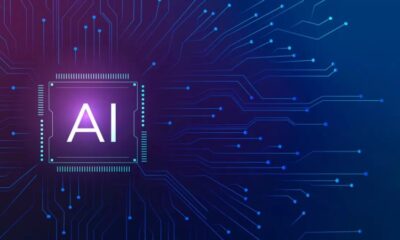This year, generative artificial intelligence (AI) grew rapidly as tech companies competed to outpace one another and lawmakers and regulators sought to impose additional restrictions.
Artificial intelligence (AI) changed society as it became more widespread and available, particularly through OpenAI’s well-liked ChatGPT chatbot. AI presented both new opportunities and risks for industries like education and film.
These are five examples of how AI is quickly altering world
ChatGPT starts a tech competition between businesses
OpenAI made a big splash when it made ChatGPT available to the public in November 2022. According to Similarweb data, the chatbot received 15.5 million visits in its first week and peaked at 1.8 billion visits in May.
The success of ChatGPT also sparked a competition amongst tech firms.
Google announced Bard, their AI chatbot, just a day before Microsoft said it would integrate ChatGPT into Bing search in February. Google announced this month the launch of Gemini, an AI model designed to help Bard become more human-like in communication and eventually strengthen the company’s search engine, as the companies continue to compete with each other to stay on the cutting edge.
will be included in both Bard and Google’s Pixel 8 Pro smartphone, the company said.
Several tech firms entered the AI competition as well. Facebook and Instagram’s parent company, Meta, declared in July that its large language model, Llama 2, would be made available for research and commercial use.
Elon Musk, the owner of Tesla, SpaceX, and X, also introduced a rival ChatGPT in November under his xAI business. According to the company, Grok, the AI, had a “rebellious streak.” Additionally, the company touted Grok’s “real-time access” to information from X, the website that was formerly known as Twitter, as a “massive advantage” over competing websites.
In a memo from December, Wedbush analysts stated that they anticipate an increase in AI spending in the tech industry through 2024. The “most transformative technology trend since the start of the Internet in 1995,” according to the analysts, is artificial intelligence.
AI leaves Congress perplexed
Congress devoted a significant portion of the second half of the year to hearings and expert meetings as businesses rapidly advanced AI technology in an effort to better understand the advantages and disadvantages of the field.
On May 10, a Senate Judiciary subcommittee heard testimony from Sam Altman, the CEO of OpenAI. As technology develops, he promised to collaborate with the government and the rest of the sector to reduce risks, forewarning that artificial intelligence may “cause significant harm to the world.”
As part of Senate Majority Leader Chuck Schumer’s (D-N.Y.) AI Insight Forums, Altman returned to the Capitol in September along with other CEOs of top AI companies, leaders of civil society, and other experts in AI to meet with senators. This was the first of a series of closed-door discussions.
CEOs of Microsoft Satya Nadella, Google CEO Sundar Pichai, Meta CEO Mark Zuckerberg, and Tesla were present at the first meeting.
Following its first meeting, the Senate hosted several more forums addressing various aspects of AI’s impact, such as risks to national security, intellectual property, and elections.
Along with Schumer, a group of senators from both parties are spearheading the endeavor: Sens. Todd Young (R-Ind.), Mike Rounds (R-S.D.), and Martin Heinrich (D-N.M.). Legislators have not yet advanced a regulatory framework to address AI, despite their praise for the bipartisan agreement on many of the issues raised.
Hollywood establishes new guidelines for AI worker protections
Concerns about how AI will affect jobs have also been raised by the technology’s advanced capabilities.
According to a March paper by researchers at OpenAI, OpenResearch, and the University of Pennsylvania, AI may have an impact on about 80% of the US workforce. The study made the case that the use of large language models in an industry could potentially impact at least 10% of the work done by 80% of the workforce.
This year, Hollywood writers and performers took the lead in obtaining AI protections through union contracts.
After a 148-day strike, the Writers Guild of America and the Alliance of Motion Picture and Television Producers reached an agreement in October that established AI protections that may serve as a model for other industries.
Giving union members the freedom to choose to use AI while forbidding studios from pressuring writers to do so was a part of the agreement.
Additionally, it made it mandatory for businesses to reveal whether any content provided to a writer was produced by AI or included content created by AI.
In November, SAG-AFTRA announced the release of its own contract with the studios, which included AI safeguards. A performer’s consent is required by the agreement in order to make a digital replica. It also specifies the terms of a performer’s compensation when using a replica, including the time required to create the replica and its intended use.
Election misinformation concerns are raised by AI
Ahead of the 2024 elections, the development of generative AI tools—particularly audio and video technology that can seem to portray people saying or acting in ways that are not true—could encourage the spread of false information about politics.
AI has been used in election content by several campaigns, most notably in the Republican presidential primary.
Congress, the Federal Election Commission (FEC), and tech companies have been pressured by these worries to think of strategies to slow the spread of misleading information.
Following pressure from the consumer advocacy group Public Citizen, the FEC is considering clarifying a rule that would also deal with the use of AI in campaigns.
Artificial Intelligence Upends Education
Schools became concerned about how students might use ChatGPT’s launch and immediate popularity to cheat on assignments.
An initial wave of technology bans was prompted by these concerns. Many have since lifted those restrictions, nevertheless, in an effort to find new ways to use technology in the classroom.
For instance, the ChatGPT ban was lifted by the New York City school system in May. Chancellor David Banks outlined the decision and the steps the schools will take to incorporate AI into the curriculum in an opinion piece that was published by Chalkbeat.
However, another worry about AI in education surfaced along with that shift: whether it will increase the digital divide for underprivileged and rural students.
AI may also have an impact on education by reducing teacher shortage worries, which have grown since the COVID-19 pandemic.


 Business3 weeks ago
Business3 weeks ago
 Business4 weeks ago
Business4 weeks ago
 Business4 weeks ago
Business4 weeks ago
 Technology4 weeks ago
Technology4 weeks ago
 Business2 weeks ago
Business2 weeks ago
 Technology3 weeks ago
Technology3 weeks ago
 Technology3 weeks ago
Technology3 weeks ago
 Technology2 weeks ago
Technology2 weeks ago










